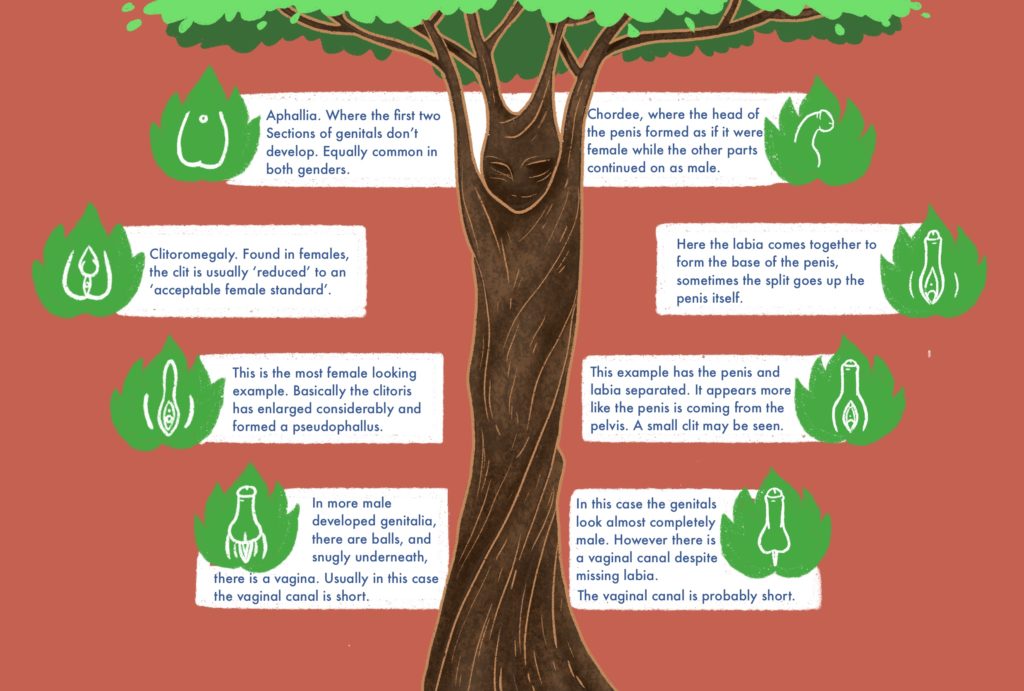By Shruti SunderramanIllustrations by Shivani PariharAshwini* was 12 when she started playing football. Now 33, she still recalls the day her friends looked at her naked body in the bathroom after a match and ran away from her, screaming. That was the day she discovered that she was neither female nor male. Her parents had never told her she was intersex. They wanted to protect her from the truth. But how can you run away from a truth that's visible? All her life, she believed her ‘truth’ to be ugly; an abomination. It took her years to understand that being intersex was nothing to be ashamed of. Intersex people are possibly some of the most misunderstood within the queer universe. Conversations about sex and sexuality often leave them behind.Here's a primer on what intersex people wished everyone knew.



Q. What does it mean to be intersex?
An intersex person is someone whose reproductive and sexual anatomy does not conform entirely to medical definitions of male or female. Intersexuality is an umbrella term and is not to be mistaken to be just one type of sexual identification. Intersex has at least 30 congenital variations of sex anatomy. No two intersex experiences are the same.Q. What are the different types of intersexualities?
There are many types and markers for intersexuality and it’s all because of a structure called chromosomes, in our body. Chromosomes are a thread-like structure and are the key to determining the sex of a human being. There are two types of chromosomes — X and Y. It's the combination of these two chromosomes that determine our gender. A combination of XY chromosomes gives us a male, and XX gives us female. Chromosomes are also responsible for puberty, sex drive and body hair Like determining males and females, chromosomes play an important role in determining sex characteristics for intersex persons. Whether a person is intersex can be determined through three indicators — their genitalia, reproductive organs and/or sexual characteristics.The uterus and fallopian tubes are examples of female genitalia while testis and prostate are examples of male genitalia. In many intersex persons, there are chances of underdeveloped genitalia, sometimes some genital organs are missing and sometimes they have ambiguous genitals.But the ambiguity of sexual organs is not always known at birth. Many intersex persons don’t realise that they’re intersex till they reach puberty and notice that their sexual organs and body parts affected by hormonal development do not look the same as others’.This brings us to the third indicator, which is the presence or absence of external characters like body hair or development of breasts. An intersex woman may not necessarily have fully developed breasts while an intersex man may not have as much body hair as is common for men. But it’s important to note that this is no clear indicator of an intersex person. Many non-intersex persons don’t have any of these sexual characteristics as well.Intersex characteristics are chromosomal and hormonal, and not just anatomical. For example, an intersex person could look completely female, but happen to have XY chromosomes (which is more usually the combination for male). Many intersex people are also born with a different combination of chromosomes, like an XXY combination of chromosomes. Some of these combinations are accompanied by what doctors call Partial or Complete Androgen Insensitivity Syndrome (AIS), in which the person’s cells don’t respond to androgens, leading to underdeveloped sexual organs.People born with gonadal dysgenesis, another chromosomal condition characterised by the incomplete or defective formation of the gonads, also fall into the intersex category.Here’s a helpful chart to understand some types of intersexual reproductive anatomies:
Q. Why does this happen?
It just…happens. It’s biological and medical. Why people are born intersex is like asking why someone is born female or male. It’s just how some people are born or develop.Q. Is intersexuality a disease or a medical condition?
It’s easy to presume that having non-binary reproductive organs is a medical condition. This, however, is far from the truth. Having reproductive and sexual anatomy that doesn't fit typical definitions of male/female is not a medical “condition” that needs to be fixed. It’s simply how intersex people are genetically made — it needs no fixing, just acceptance. Acceptance, as intersex people will tell you, is hard to get. Many parents wonder if they should immediately get surgery for their intersex babies’ genitalia. This can be a major ethical dilemma. Parents might think they are acting in their child’s best interest to assign them a more predictable sexual identity. But today, there are debates about whether parents or doctors can or should make such huge decisions. How can they possibly know what lies in our hearts and our futures, ask intersex people. In its ‘Free & Equal’ campaign for LGBT equality, the United Nations Human Rights Commission states that sex corrective surgeries should be avoided because they are often irreversible procedures and can cause permanent infertility, pain, incontinence, loss of sexual sensation and lifelong mental suffering, including depression. And yet, stigma, ignorance and prejudice lead many parents to ‘fix’ their intersex children with invasive surgical procedures.Importantly, many intersex people (or their parents) don’t know they are intersex from childhood. Sometimes, people don’t realise they’re intersex till puberty; for some intersex persons, reproductive organs develop only at or after puberty. This can be very confusing as well. Imagine having believed you are female all your life, only to find that your body has changed.Q. So… intersexuality is a type of gender?
No, intersexuality denotes biological sex, that is determined by medicine and biology, just like male or female. Gender, on the other hand, is what someone identifies with psychologically — like man, woman, non-binary. This is a common misconception people have about intersex people. A common and untrue assumption is that intersex people choose their sex.Q. Are transgender people and intersex people the same then?
Another no. Intersex people are often confused with transgender people.Transgender people are people whose gender identity (like man, woman, non-binary, etc) differs from the gender they were assigned at birth. Transgender is about being the gender a person identifies with, while intersexuality is about a whole different sex. An intersex person may identify themselves as transgender but is not transgender by default. Though there may be overlaps, they are not the same and each functions differently in terms of identity politics.Q. Are intersex people automatically gay or lesbian?
Another common assumption is that intersex people identify with the ‘LGBA’ in LGBTQIA. This is untrue. An intersex person does not necessarily have to be gay or lesbian or bisexual or asexual; they could be any of them or none. As with anybody else, an intersex person’s sexual orientation is not decided by their sex but by their sexual orientation. If an intersex person identifies himself as a man and is attracted to men, then and only then can he be called gay. Assuming that an intersex person (or a trans person) is automatically gay or lesbian is another misconception.Q. How different are intersex people from hijras?
Hijra is a cultural community and cultural identity. It is a community consisting of mainly transgender persons who were born male but either identify themselves as a woman or don’t identify themselves with either gender; and also intersex persons. Some hijras choose ritual castration, and these days may also seek sex reassignment surgery. Not all Hijras are intersex although some intersex persons may choose to join the Hijra community.An intersex person may or may not have non-conforming genitalia. Intersex people are neither a community nor tied to a geography, as groups of hijras are. The hijra community is recognised as the third gender in India and other parts of South Asia, whereas, as mentioned before, intersex is not a gender but a whole different sex.Q. What’s the difference between a hermaphrodite and an intersex person?
A technical definition for hermaphrodite is someone who has completely developed male and female reproductive organs — ovarian and testicular tissue both. But if you want to know if intersex people differ from hermaphrodites because of underdeveloped organs, there’s an important distinction to make here. According to the Intersex Society of North America, hermaphrodite is a mythical term – it’s not medically possible to have fully developed male and female reproductive organs in the same body. Hermaphrodite is a mythical concept while intersex is a legit, medically-sound term. The term ‘hermaphrodite’ is outdated and is considered offensive by most intersex persons.Q. Is romance different in the intersex world?
Intersex people fall in love, date and want romance like everyone else. A straight intersex woman can be easily dating a bisexual/straight man. A bisexual intersex man can seek love with a gay man. It’s not the unavailability of combinations under the many non-binaries of gender and sexuality that pose a problem for intersex people, it’s the stigma and the jungle of misconceptions that have to be fought through. But love (and activism) often find a way.



































































































































































































































































































































































































































































































































































































































































































































































































































































































































































































































































































































































































































